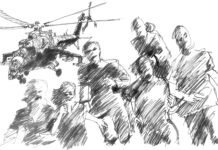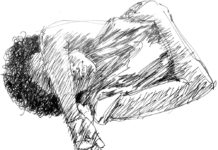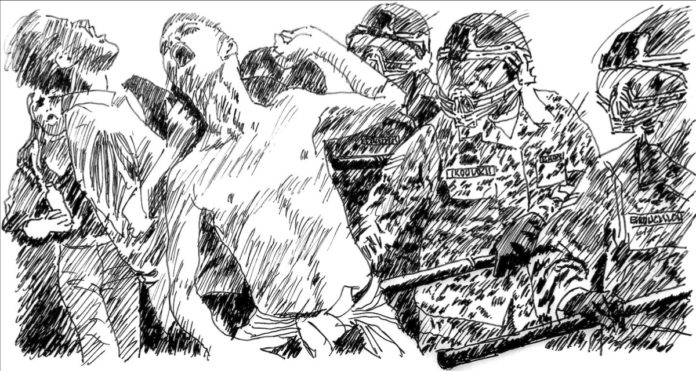By Ted Leonhardt
Brie was working from home when…
“Mom, Mom! There’s soldiers in the streets.”
Looking out the window and seeing nothing, I asked, “Honey, where did you see them?”
“Just outside the school. They were unloading from those huge, slick white buses. The ones you see at Facebook and Amazon.”
Jamal’s 13 and deeply into dystopian novels. I pushed my laptop aside, and the General Motors contract with it.
“Honey, was there any announcement at school, any trouble?” I’m thinking the worst now. School shooting? Major pushback on student activism? What?
Jamal was typing madly into his phone now. Not hearing me.
I went to my twitter feed and immediately saw the photos of armed troops surrounding a group of students holding signs. Fear’s breath touched me.
The dark fantasy continues.
From promise to despair
The industrial revolution halted the endless-poverty cycle.
Once we chose coal and then oil as our sources of energy—and capitalism as our economic system—it seemed as though wealth for all, with no downside, was a real possibility.
But there is a downside. The planet has limits. Our disposable lifestyles have taken a toll, and the increasing temperatures are changing everything.
And there is greed. It turns out the great surge that built the middle class has limits in the minds of the rich. They want more. They’re in control. That means we get less.
And with soldiers at Jamal’s school, we can see that things have gone too far.
Heavy industry moves our way
The GM contract I’m finalizing is our co-op’s first with one of America’s industrial giants.
No, in the short term it won’t stop the soldiers at Jamal’s school. The icy sensation down my back returns. But if we get this right, we can help a lot of people. Millions of people.
A co-op future for creatives
Several years ago, a group of us creatives began exploring a worker-owned co-op. We wanted a steady income and a share of the profits from our work. It seemed to us that control of the revenue that resulted from our work was not only a good and logical outcome, but could be inspirational as well.
Our founders came from careers in the arts, entertainment, advertising, education, film, photography, architecture, illustration, writing and design.
We decided early in our planning that the world didn’t need another design firm, ad agency, video production company, architectural consultancy or other creative offer. On the one hand, those markets were awash with competitors and experiencing shrinking revenues. And on the other, we were tired of having our work only valued when we were selling stuff.
We also were alarmed at the damage being done politically, socially and to the planet. And we were concerned that much of our past professional work as creatives was contributing to the harm being done.
So we dedicated ourselves to finding a direction that not only would provide us an income and satisfying work, but one that actually would be good for people and the planet. And we found it in speculative fiction.
How we got GM
Bill Jones, the chairman of GM, has asked us to help him with the transformation he and his board have initiated for the company. He’d attended the “Creativity Challenges Dystopia” event we’d put on at the Detroit Auto Show, and was intrigued. Intrigued enough to check us out.
From Charles Dickens’ serial novels to Suzanne Collins’ Hunger Games trilogy, speculative fiction has long broken barriers and explored issues of race, political inequality and injustice. The use of dystopian, apocalyptic futures with imaginary elements, and often magical technology, lets writers confront controversial issues, granting them the power to envision—and shape—the future.
Fantasy: a better tomorrow
We believed we could use the lessons from speculative fiction to save us from a dystopian future—imagination and fantasy, employed to save us all.
Early in the forming of our creative co-op, we struck upon the idea of using our diverse creative experience to help organizations envision a better future. We landed on the use of fiction, coupled with a series of exercises to provide insights into the darkest of possible futures, to devise how to avoid anarchy.
And that’s what Bill Jones has asked us to do… to help him and his entire workforce understand the dangers we face, imagine the steps to make things better and then begin the process of changing the company to make it a key player in creating a better future. Our goal: Mutually created insights into tomorrow that will help us all get there.
With the soldiers at Jamal’s school, we’re living in a dystopian present.
Helping each other
Terrified for my son and his classmates, I called the chairman.
“Bill, it’s Brie. I was in the middle of reviewing our contract this morning when my son reported that soldiers were shutting down a protest at his school.”
“God, Brie, that’s terrifying. Is he OK?”
I went on, filling Bill in on the morning’s frightening events, and asked: “It’s all over social. Could you connect me to someone in the White House who could shut this down before anyone gets hurt?”
“Yes, I can. I’ll get right back to you.” And then he hung up.






